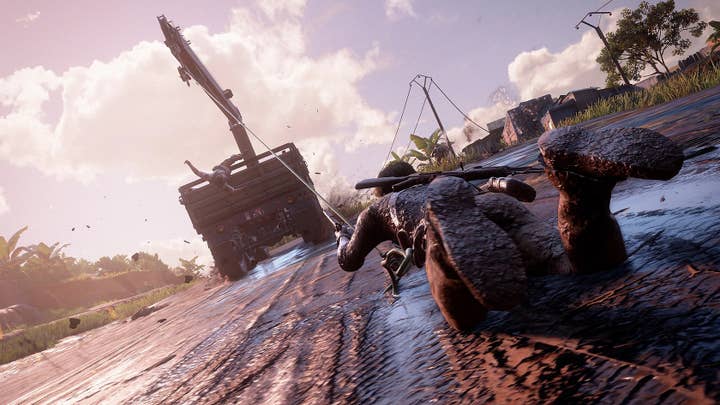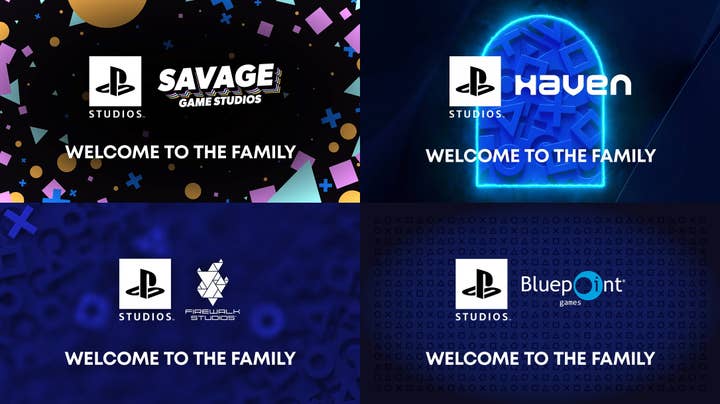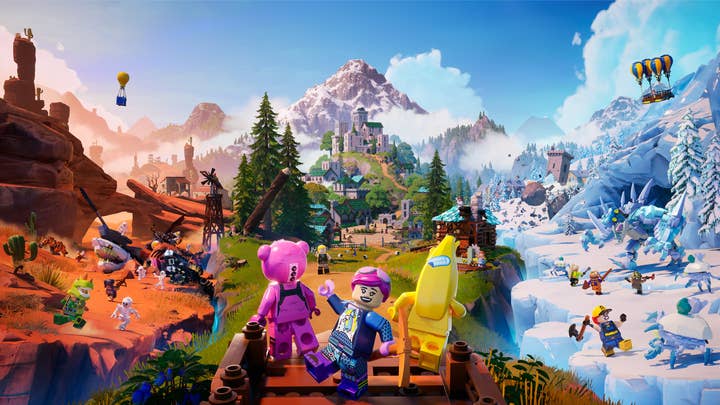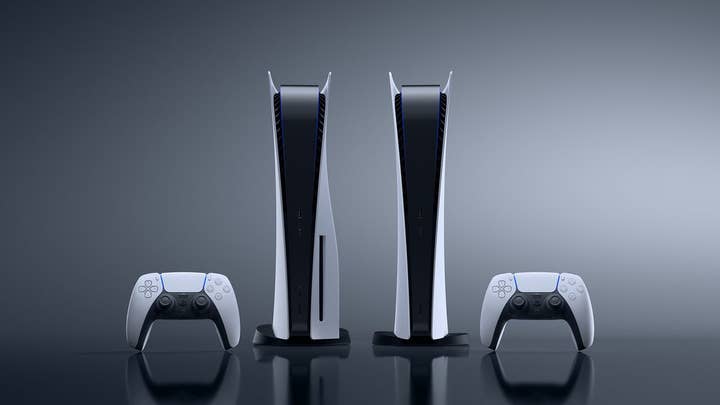What led to Sony laying off 900 people? | This Week in Business
Sony's president complained about unaccountable developers missing budgets and schedules, but there are other culprits behind the game division's thin profit margin
Sign up for the GI Daily here to get the biggest news straight to your inbox
This Week in Business is our weekly recap column, a collection of stats and quotes from recent stories presented with a dash of opinion (sometimes more than a dash) and intended to shed light on various trends. Check every Friday for a new entry.
Sony Interactive Entertainment this week announced plans to cut 900 workers from the PlayStation payroll, or about 8% of its global workforce.
In and of itself, this is a sadly common bit of news. Already this year we've seen Electronic Arts take the axe to 5% of staff, while Supermassive cut about 26%, Wildlife Studios dropped 21%, Deck Nine Games trimmed 20%, Radical Forge shed a handful of staff, Cloud Imperium Games laid off an unknown number, and Die Gute Fabrik basically called it quits, halting production until it finds funding in some unspecified future timeframe.
Wait, that was all just this week? Well at least the year's almost over, right?
Just as it's easy to lose sight of the human cost of a layoff once the numbers get big enough, it's tempting to stop considering these as decisions taken by individual companies for varying reasons and just gesture in the direction of interest rates or "the economy" as the reason why all these people had to lose their jobs.
Sony's not one of these companies you watch floundering and say, "Yeah, that sounds about right."
And sure, that has an impact. But Sony's not Unity or Embracer or one of these companies you watch floundering and say, "Yeah, that sounds about right."
Sony's a consistently profitable market leader riding the success of the PS5 and a blockbuster line up of hits both expected (Spider-Man 2) and otherwise (Helldivers 2). So why the layoffs?
Well, as Sony president Hiroki Totoki explained in the company's recent financial earnings report, the PlayStation business is profitable, but not profitable enough.
STAT | 5.8% - Sony's projected profit margin for the Game and Network Services division for fiscal year 2023, which ends March 31, 2024. It will be the third straight year of declines, coming down from 6.9% in FY22, 12.6% in FY21, and 12.9% in FY20.
That's not a great trend in a vacuum, but it could be worse. For example, let's compare the above numbers – the first four years of the PS5 generation – with the gaming division's performance at the start of the PS4 generation.
STAT | -1%, 3.5%, 5.7%, 8.2% - In order, the profit margins from Sony's FY13, FY14, FY15, and FY16.
For the start of a console generation when the hardware is being sold at a loss and actively hurting the bottom line, it actually looks like the PS5 years have been pretty amazing for Sony.

The trend may be going in the wrong direction, but I think the pandemic might have had a hand in making the early PS5 years as profitable as they were. And in the past three years specifically, Sony has noted declining third-party sales as a negative impact on its profitability, and that is to some extent outside of the platform holder's control.
For a fair comparison, we should note that the PlayStation Vita's failure hurt the bottom line in the early years of the PS4 generation as well, so perhaps something in between these sets of numbers would be a better place to set expectations for profitability of a successful console platform holder.
Regardless of whether or not Sony's expectations are reasonable, the point remains that the company is unhappy with the profitability of the business as it stands. Part of that is no doubt due to the escalating cost of AAA development, as we mentioned in the column a couple weeks back, and as Totoki himself pointed out.
QUOTE | "People who work in the studios have very high motivation. They're very highly motivated. They're very good people. And they're very creative people. They have great creative minds. And they also have knowledge about live streaming. However, having said that, when it comes to the business itself, I think there is room for improvement. And that's got to do about how to use the money or about the schedule of development or how to fulfill one's accountability towards development, etc." – Totoki criticized the company's first-party studios last month for not being more profitable in an investor briefing, as reported by Gematsu.
[Clarification]: Gematsu's story has been updated with Sony's official translation of the earnings call, which has Totoki saying developers throughout the organization "don't necessarily understand how their respective efforts tie into overall growth, sustainable profit generation, and higher margins," but the quote above was in response to a question about Bungie specifically.[/Clarification]
Sony's president thinks the problem is unaccountable developers. They are bad with money, you see, and they don't stick to the schedule
There you have it. Sony's president thinks the problem is unaccountable developers. Good people, yes. Creative people, certainly. But they are bad with money, you see, and they don't stick to the schedule.
It is true that Sony's first-party titles often seem designed to beat the player over the head with how expensive they are to make, what with their uncompromising fidelity and unreasonable scope. And Sony's blockbuster games have been delayed from time to time. But I suspect only a handful of the 900 people being held accountable this week were dictating project budgets and setting the release schedules.
On top of that, I think the profit margin problems in recent years are more than just a matter of Insomniac or Naughty Dog being a little bit wasteful in how they work.
There are other complicating factors, like Sony investing in the creation and release of a technologically impressive and expensive virtual reality headset peripheral, and then denying it the kind of marketing and software support it would need to be successful.
And if we're talking about being irresponsible with money, maybe we should be looking at the decision to go an acquisition spree – sprees tend to be the opposite of responsible – costing the company billions up front and inflating headcount and payroll for the future.
STAT | 13 – The number of companies Sony acquired and added to the PlayStation family since the beginning of 2021, including Housemarque, Bluepoint, Nixxes Software, Firesprite, Fabrik Games, Valkyrie Entertainment, Firewalk Studios, Haven Studios, Savage Game Studios, Audeze, iSize, the Evo fighting game tournament, and the cherry on top, Bungie.

That's a surprisingly aggressive run of deals, especially for a company that went 21 years between shipping its first game with Insomniac (Spyro the Dragon on the original PlayStation) and finally acquiring the studio in 2019.
"Buying studios right now is a very expensive undertaking. It is most definitely a seller's market"Jim Ryan, in 2019, with no idea of the world to come
It's also surprisingly aggressive considering PlayStation CEO Jim Ryan was preaching caution on the acquisitions front just a few months before the pandemic happened.
QUOTE | "Buying studios right now is a very expensive undertaking. It is most definitely a seller's market. There is room for us to do more in that area, but we have to make sure that the company is right. The integration side of things... which is a boring business thing to talk about, but the world is littered with illustrations of that going catastrophically wrong post-acquisition." – Sweet summer child Jim Ryan speaking to us in November of 2019, blissfully unaware of the imminent pandemic that would redefine the entire concept of "a seller's market."
While the pandemic changed the market and almost everything else, one thing it did not change was the possibility of things going catastrophically wrong post-acquisition.
QUOTE | "Sony has committed the worst possible mistake in buying a studio and meddling to the point where it may end up in a death spiral and unable to complete any of the projects it is working on." – A source with Firesprite, speaking with Eurogamer for an investigative piece that was just published yesterday. Various sources described a drastic change in studio culture, Sony installing new management that quickly racked up more than a dozen sexual discrimination and ageism complaints, crunch, and massive turnover as key employees jumped ship.
And considering Haven, Firewalk, and Savage (now Neon Koi) are all new studios that haven't shipped a game but have been racking up no-doubt considerable expenses by working on AAA live service projects, they're nothing but an anchor on the profit margin until they get something out the door.
Sony has also been burned by taking teams that specialized in one type of game and putting them to work on a very different type of title, like Naughty Dog's cancelled The Last of Us live service spin-off, PSVR developer/support studio Firesprite's now reportedly cancelled Twisted Metal live service game, or VR specialist PlayStation London Studio's live service online combat game, which is now presumed dead considering London Studio was closed with this week's cuts.
And then there was Bungie, the big deal acquisition that instantly made Sony into a major live service operator with the arrival of the Destiny franchise. Unfortunately, Destiny 2 has not thrived since the pick-up, with the game's annual revenues reportedly running 45% behind its projections last October when the studio laid off about 100 people.
And while the two don't necessarily need to be related, I am not terribly surprised that this struggling pivot toward live service games – Sony planned to launch a dozen live service launches before April of 2026 but cut that number in half last November – is coinciding with a year in which Sony has already said it will have no major first-party releases, which isn't going to do that all-important profit margin any favors.
Sony is a platform holder at the midway point of its flagship platform's lifecycle. This is not a good time for the new release pipeline to run dry
A year of nothing new is the sort of thing you can get away with if you're a third-party publisher with a healthy live service business. In 2017, NBA 2K and Grand Theft Auto Online kept Take-Two chugging along just fine even though the publisher went without a major non-annualized release after the delay of Red Dead Redemption 2.
But Sony is a platform holder at the midway point of its flagship platform's lifecycle. This is not a good time for the new release pipeline to run dry, and it doesn't have live service hits to help carry it through.
It might have expected them by now, considering Sony went big on live service games at the peak of the pandemic. But that was jumping in on the trend when user engagement was at an all-time high and every developer and its parent company decided that games utterly reliant on engagement in order to make money was the way to go.
In addition to player habits changing once the audience had the option to seek other activities, we've also had a ton of new live service games launch in the hopes of replicating the success of platforms like Fortnite and franchises like EA Sports FC. But those games aren't going anywhere.

If you want to make your game someone's daily habit now, there's a good chance you need to break them free of some other game's grip, because there are only so many hours in the day to go around, and a live service business needs as many of them as possible to make the math work. There are plenty of headlines about apparently well-received live service games that nonetheless shut down because happy players couldn't make them viable on their own.
Sony doesn't yet have a successful live service business to rely on despite the copious bets it has placed trying to build one.
STAT | ¥300 billion (about $2 billion by today's exchange rates) – The amount Sony reportedly dedicated to games R&D for the fiscal year ending next month, with a focus on live service games and extended reality.
It's not that I don't believe in R&D spend or taking risks to chase innovation, but I've got some pretty clichéd thoughts when it comes to egg distribution as it pertains to baskets, specifically the ideal quantity therein.
And on this point, I can't help but wonder if the way Sony runs today has made it more likely for it to run into problems like this. Prior to 2018, Sony Interactive Entertainment had three main branches operating somewhat independently: America, Europe, and Japan/Asia.
Having everyone pulling in the same direction can enable you to go further, but whether that helps or hurts depends on the people in charge picking the right direction in the first place
Each branch had greater autonomy in the way it made and marketed games for its region, which had advantages in that things could be more effectively directed to target audiences, but also obvious inefficiencies in that some of the same work would essentially be done three different times over, and there was no clear centralized strategy for everything to be focused around. That changed when those divisions were unified in 2018 under a single leader in Jim Ryan.
That globalization process was in motion before Ryan took over, and I don't even necessarily think it was a terrible decision in the grand scheme of things. But it does strike me as a big part of Sony's current woes. Having everyone pulling in the same direction can enable you to go further, but whether that helps or hurts depends on the people in charge picking the right direction in the first place.
And maybe this all works out in the long run. Maybe the acquisitions mostly work out, the live service games Sony has left in development click and the company gets its own new Fortnite or whatever competing live service staple it has spent years coveting. Maybe it has a vibrant pipeline of the reliable blockbuster exclusives that got it to this point, all just waiting to start launching after that one-year reprieve of major releases.
But for the moment at least, the road ahead for PlayStation looks considerably worse than the sizeable-but-shrinking successes in the rear-view mirror. For the moment, it looks like Ryan significantly missed the mark with live services, pushing the entire organization in the wrong direction, or maybe even the right one but at the wrong time.
It's cold comfort for the laid off, but at least he will be following them out the door. Sony announced back in September that Ryan would be retiring this month.
This industry doesn't have a great track record when it comes to accountability, but when leaders make decisions that result in 900 employees being forced out of work for no fault of their own, the least we should expect is those leaders aren't left in a position to do it all over again.
The rest of the week in review
QUOTE | "This year, Suicide Squad, one of our key video game releases in 2024, has fallen short of our expectations since its release earlier in the quarter, setting our games business up for a tough year-over-year comp in Q1." – In discussing the performance of Rocksteady's Suicide Squad: Kill the Justice League, Warner CFO Gunnar Wiedenfels confirms that Sony's not the only company whose live service ambitions aren't coming together like they expected.
STAT | $500 million – Saber Interactive is reportedly going independent again as a private investor group will pay half a billion dollars to pry the company away from debt-saddled Embracer.
QUOTE | "This opportunity allows us to return to our roots of being a small and nimble studio." – Toys For Bob studio heads Paul Yan and Avery Lodato announce that the studio is going independent and spinning out from Microsoft. There are apparently no hard feelings, as the Crash Team Rumble developer is exploring a partnership with Microsoft and said its parent companies (Activision and Microsoft both) "have been extremely supportive of our new direction."
STAT | €17 million – Remedy re-acquired the rights to Control from the game's original publisher, 505 Games, for €17 million. The deal covers Control, its upcoming sequel, and the multiplayer spin-off Condor.
QUOTE | "Right now, we're focused on just being a company. We are a bunch of game developers from Volition who have banded together. It's just one foot in front of the other right now." – Shapeshifter Games studio director Rob Loftus explains how the co-development studio started up in Champaign, Illinois, the home of its shuttered predecessor.
As rough as the industry headlines have been, it seems to be creating some opportunity for limited reversals in the overall consolidation process here and there.
STAT | About 1.5 years – EA shut down Ridgeline Games this week, about a year and a half after it announced the studio's creation. Halo developer Marcus Lehto, who had been brought in to create the studio, also announced his departure from EA this week, saying it was of his own accord.
QUOTE | "It is hard to convince yourself when you wake up that today is not the day [you'll be laid off]. It's very hard to do that. Just continue doing your work, continue walking through your projects, and just be like, okay, I made it through another day, especially as a developer of color… You have to be built a little bit differently to stay resilient in this industry." - In another of our Black Voices Progress Report features, Crystal Dynamics' Vanessa Brasfield acknowledges the impact the past year of layoffs has had even on developers who have stayed employed.
QUOTE | "It's incredible that this is an industry with opportunity. Yes, layoffs are happening, and businesses are not treating people correctly. But people aren't playing games less. More people are always exposed to games in so many ways... Yes, there's a mountain of sadness and poor management, but we can pierce through that. There's no way they could snuff out the fire of video games." – In our last Black Voices Progress Report feature of February, Focus Entertainment's Funké Joseph offers a reminder to stay positive about the games industry.
QUOTE | "This is a departure from the games I've worked on, but one that showcases my passion for rich characters, precise mechanics, more intimate storytelling, and plenty of action." – Former Call of Duty designer David Vonderhaar talks about opening up his new studio BulletFarm as part of NetEase.
QUOTE | "The story of Immortals isn't written yet. I was the creative director on Dead Space, and people were discovering that for years and years. I think Immortals will be the same." – In a candid interview discussing the disappointing financial performance of Immortals of Aveum, Ascendent Studios' Bret Robbins talks about the reception to the game and the future of the studio.
STAT | $1.2 billion – Mobile publisher Playtika has paused its search for a buyer and instead aims to spend $1.2 billion on mergers and acquisitions over the next three years.
QUOTE | "With Yuzu in hand, nothing stops a user from obtaining and playing unlawful copies of virtually any game made for the Nintendo Switch, all without paying a dime to Nintendo or to any of the hundreds of other game developers and publishers making and selling games for the Nintendo Switch." – Nintendo in a recently filed lawsuit against the makers of the Yuzu emulator. The Switch maker must be pretty confident about its chances here, given its hesitance to file suit in other cases where it believes the law is on its side, lest it lose and set a precedent in favor of emulators.
Personally, I'm irritated Nintendo is going after the small-timers while it won't even put up a fight against Amazon's open piracy.
QUOTE| "Candy Crush Saga, what I think is so brilliant about how they did it is that… again, that game is kinda pornographic if you think about it…" – EA founder Trip Hawkins says, uh… Well, we're not exactly sure what the hell he was saying. But whatever it was, he said it in a DICE Summit presentation we revisited in the latest 10 Years Ago This Month column. (It was not the only head-scratching thing he would say.)
Sign up for the GI Daily here to get the biggest news straight to your inbox

